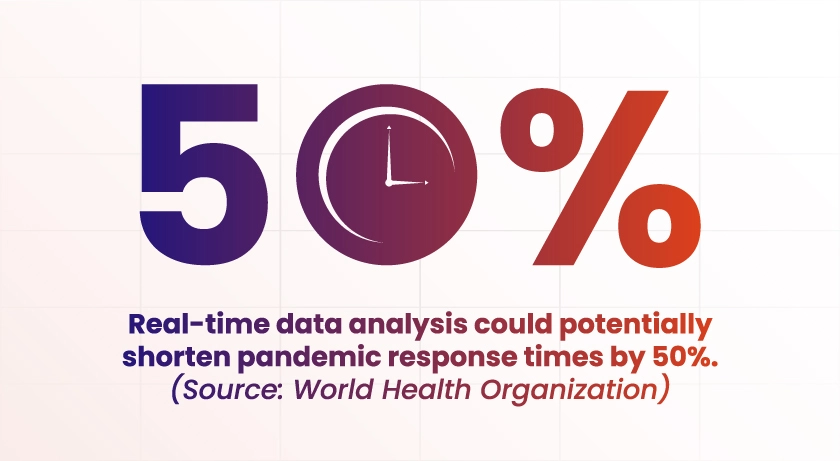- Blog
- February 19, 2024
The Role of Data Analytics in Addressing Global Health Challenges

- Blog
- February 19, 2024
The Role of Data Analytics in Addressing Global Health Challenges
The world faces a diverse landscape of health challenges, ranging from infectious diseases and chronic conditions to malnutrition and mental health issues. In this complex scenario, where resources are often limited and solutions multifaceted, a powerful ally emerges: data analytics.
From Insights to Impact:
Traditionally, public health interventions relied on estimations and educated guesses. But with the exponential growth of healthcare data, the game has changed. We now have access to mountains of information – electronic health records, disease surveillance data, social media trends, and environmental indicators – waiting to be unlocked.
Data analytics provides the key to this treasure trove. By analyzing this data, we can gain invaluable insights into:
-
- Disease Spread and Trends:
At the forefront of battling infectious diseases lies the ability to understand their spread patterns and anticipate future outbreaks. Through sophisticated data analytics techniques, such as machine learning algorithms and predictive modeling, public health officials can identify emerging trends, hotspots of infection, and vulnerable populations. By deciphering vast amounts of epidemiological data in real-time, they can deploy targeted interventions and allocate resources where they are most needed, effectively curbing the spread of diseases and saving lives. - Risk Factors and Prevention: In today’s healthcare landscape, a fundamental transformation is underway, with a growing emphasis on proactive and preventive care. Central to this shift is the integration of data analytics into clinical practice, empowering healthcare professionals to delve deep into patient data to unearth underlying risk factors for chronic illnesses like diabetes, cardiovascular diseases, and cancer. Through comprehensive analysis of demographic, genetic, lifestyle, and clinical data, healthcare providers can identify individuals predisposed to these conditions. Equipped with this invaluable insight, personalized prevention plans can be tailored, encompassing lifestyle adjustments, early screenings, and precisely targeted interventions. This proactive approach not only mitigates the impact of disease on individuals but also alleviates the strain on healthcare systems, heralding a new era of preventive medicine powered by data analytics.
- Treatment Optimization – In the realm of precision medicine, one size does not fit all. Every patient presents a unique set of clinical characteristics, genetic makeup, and environmental factors that influence their response to treatment. Data analytics enables healthcare providers to harness this wealth of information to tailor treatment plans to individual patients, optimizing efficacy and minimizing adverse effects. By analyzing vast repositories of clinical trial data, researchers can identify predictive biomarkers, therapeutic targets, and optimal treatment regimens for various diseases. This data-driven approach not only enhances patient outcomes but also accelerates the pace of medical innovation, ushering in a new era of personalized healthcare.
- Resource Optimization: Ensuring equitable access to healthcare services while optimizing resource allocation is essential for the efficient functioning of healthcare systems. Data analytics serves as a powerful tool in this endeavor, providing deep insights into the intricacies of healthcare operations. By scrutinizing patient flow, resource utilization patterns, and clinical outcomes, healthcare administrators can pinpoint inefficiencies and bottlenecks, paving the way for targeted improvements. Whether it involves fine-tuning hospital staffing, optimizing inventory management, or directing investments towards critical infrastructure, data-driven decision-making drives systemic change and elevates healthcare delivery standards on a global scale.
- Disease Spread and Trends:

Personalized treatment based on patient data could save $460 billion in healthcare costs globally by 2030. (Source: PwC)
Real-World Impact, Global Reach:
These insights are already translating into tangible results:
-
- Ebola Outbreak Control: During the devastating 2014 Ebola outbreak in West Africa, real-time data analysis played a pivotal role in tracking the spread of the virus. By swiftly identifying affected areas and high-risk populations, healthcare authorities could allocate resources strategically, implement targeted interventions, and contain the outbreak more effectively. This proactive approach not only helped save lives but also served as a blueprint for future epidemic response strategies worldwide.
- Maternal Health Improvement: The analysis of birth records and maternal health data has emerged as a powerful tool in predicting and preventing complications during pregnancy. By leveraging data analytics, healthcare providers can identify high-risk pregnancies early, allowing for timely interventions and personalized care plans. From monitoring vital signs to tracking prenatal care, data-driven insights empower expecting mothers and healthcare professionals alike, leading to improved maternal health outcomes and reduced risks for both mothers and babies.
- Chronic Disease Management: The advent of AI-powered platforms marks a paradigm shift in the management of chronic diseases like diabetes, heart disease, and hypertension. By tapping into vast reservoirs of patient data encompassing medical history, genetic profiles, and lifestyle factors, these platforms can craft bespoke treatment plans tailored to the specific needs of each individual. Whether it’s fine-tuning medication dosages or offering personalized lifestyle recommendations, these data-driven interventions not only optimize health outcomes but also empower patients to take charge of their well-being. Through the seamless integration of continuous monitoring and adaptive learning mechanisms, AI-driven solutions have the potential to revolutionize chronic disease management, ushering in an era where proactive, personalized care becomes the norm, thus elevating the quality of life for millions across the globe.

Real-time data analysis could potentially shorten pandemic response times by 50%.
(Source: World Health Organization)
Solutions for Addressing Key/Few Challenges:
-
- Keeping Health Data Safe and Easier to Use:To make sure health information stays private and secure, we need to use strong protections like locks and special codes. We also need clear rules about who can see the information and how it’s used. Everyone involved, like doctors and patients, should know what’s happening with the data so they can trust it.
We should update our computer systems in hospitals and clinics so they can talk to each other better. This helps share important health information quickly and easily. Even in places where there isn’t a lot of technology, we can work with both public and private groups to make sure everyone can use and share health data. - Working Together and Doing the Right Thing:People from different groups like governments, scientists, doctors, and communities need to team up to solve big health problems. We should respect each other’s ideas and make sure we’re being fair and honest. It’s also important to follow rules and guidelines that protect people’s rights and privacy.
- Investing in Better Technology:We should spend money to improve the tools and systems we use to understand health data. This could mean getting new computers or hiring people who know how to use them well. By investing in new technology, we can make it easier for everyone to learn about health and find new ways to help people.Doctors and nurses should learn more about how to use data to help patients. This might mean taking classes or learning from others who know a lot about health and computers. By teaching more people about health data, we can make sure everyone knows how to use it to help others.
- Public Awareness and Engagement:Increasing public awareness about the importance of data analytics in improving healthcare outcomes is crucial. Engaging with patients and communities to educate them about the benefits and risks of data-driven healthcare initiatives is necessary. Fostering a culture of data-driven decision-making and accountability among healthcare stakeholders can promote responsible use of data.
Challenges and Opportunities:
While data analytics holds immense potential, challenges remain:
- Keeping Health Data Safe and Easier to Use:To make sure health information stays private and secure, we need to use strong protections like locks and special codes. We also need clear rules about who can see the information and how it’s used. Everyone involved, like doctors and patients, should know what’s happening with the data so they can trust it.
-
- Data Privacy and Security: Safeguarding patient data privacy and security is paramount in the realm of global health. While leveraging data for public health initiatives holds immense potential, it must be done in a manner that respects individual privacy rights and maintains confidentiality. Robust data encryption protocols, stringent access controls, and comprehensive privacy policies are essential components of a secure data ecosystem. Moreover, transparency in data handling practices and informed consent mechanisms empower patients to make educated decisions about the use of their data, fostering trust and confidence in healthcare systems.
- Data Access and Infrastructure: Establishing robust data access and infrastructure is critical, particularly in resource-limited settings where healthcare disparities are most pronounced. This entails investing in modernized healthcare information systems, interoperable data platforms, and reliable connectivity infrastructure to facilitate seamless data exchange and analysis. Additionally, capacity-building initiatives are essential to equip healthcare professionals with the skills and tools needed to collect, manage, and interpret data effectively. By democratizing access to data and fostering a culture of data literacy, we can empower communities to harness the transformative potential of data-driven healthcare solutions.
- Collaboration and Ethics: Collaboration lies at the heart of effective data-driven approaches to global health. Governments, researchers, healthcare organizations, and communities must come together to address complex health challenges while upholding ethical principles and equity considerations. This entails establishing robust governance frameworks to guide data sharing and usage, ensuring transparency, accountability, and fairness. Furthermore, engaging with local communities and respecting cultural sensitivities is essential to foster trust and inclusivity. By embracing a collaborative ethos grounded in ethical principles, we can harness the collective wisdom and expertise of diverse stakeholders to drive meaningful progress in global health outcomes.
Looking Ahead: A Data-Driven Future for Health:
In envisioning the future of global health, data analytics emerges as a cornerstone. Despite obstacles like data privacy and access, embracing data responsibly offers a path to equitable healthcare and targeted solutions for worldwide health challenges. In this future, data will empower individuals and healthcare providers, transforming prevention, detection, and treatment approaches. Collaborative efforts among stakeholders ensure progress while maintaining ethical standards. By harnessing data responsibly, we chart a course toward a healthier, fairer world for all.




